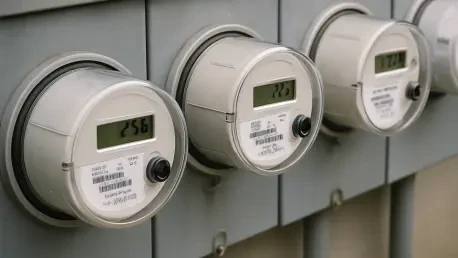The landscape of energy management in Saudi Arabia is undergoing a profound transformation, with the smart meters market emerging as a pivotal element in this shift, projected to grow at an impressive compound annual growth rate (CAGR) of 11.14% from 2025 to 2033, and valued at USD 2,185.42 million in 2024. This sector is becoming integral to the Kingdom’s broader sustainability and energy efficiency goals. Smart meters, advanced tools designed to monitor electricity, gas, and water usage with remarkable accuracy, are redefining how resources are tracked and managed. By delivering real-time data and enabling dynamic pricing models, these devices are laying the groundwork for a smarter, more responsive energy grid, powered by the integration of Internet of Things (IoT) technologies and sophisticated communication systems. This growth is closely aligned with Saudi Arabia’s Vision 2030, a strategic blueprint aimed at diversifying the economy and modernizing infrastructure. As smart meters gain traction across residential, commercial, and industrial domains, they are positioned as a linchpin in reducing energy waste and enhancing grid reliability. The momentum behind this market reflects a national commitment to digital transformation, setting the stage for a future where energy consumption is not just monitored but optimized for sustainability.
Vision 2030 and Government Backing
Government support stands as a cornerstone of the burgeoning smart meters market in Saudi Arabia, with Vision 2030 providing a robust framework for technological advancement and energy modernization. This ambitious plan emphasizes energy efficiency as a key pillar, driving the widespread deployment of smart metering systems to revolutionize how utilities operate. The Saudi Electricity Company (SEC), the Kingdom’s leading utility provider, has already rolled out millions of smart meters across the nation, creating a digital network that enhances billing precision and minimizes operational losses. This initiative is a testament to the government’s dedication to building a smart grid ecosystem, ensuring that energy distribution becomes more reliable and responsive to demand. High-profile events, such as the Saudi Smart Grid Conference held in December 2024, further underscore this commitment, spotlighting the role of automation and connectivity in reshaping the energy sector. Such platforms bring together industry leaders and policymakers to discuss strategies for integrating smart technologies, reinforcing the market’s growth trajectory and inspiring confidence among stakeholders.
Beyond specific projects, the broader digital economy in Saudi Arabia is fostering an environment ripe for smart meter adoption. Recent data indicates that the digital economy contributed 15.6% to the Kingdom’s GDP in 2023, reflecting a significant uptick in technology integration across various sectors. With over 70% of internet-connected establishments utilizing smart devices, the groundwork for widespread acceptance of smart meters is firmly in place. This digital surge, coupled with the government’s focus on local manufacturing and technology transfer, ensures that the smart meter infrastructure is not only cutting-edge but also customized to meet the unique demands of the Saudi market. The synergy between policy support and digital progress creates a fertile landscape for sustained market expansion, positioning smart meters as a vital component of national development goals.
Market Dynamics and Technological Segmentation
Diving into the structure of the smart meters market in Saudi Arabia reveals distinct segments that highlight varied growth patterns and technological preferences. In 2024, Automated Meter Reading (AMR) technology held a dominant position due to its cost-effectiveness and ease of scalability, making it an ideal choice for utilities embarking on the journey toward full automation. AMR systems streamline billing processes and reduce human error, earning trust from both providers and consumers. While this technology serves as a practical stepping stone, it is paving the way for a gradual transition to more advanced solutions. The focus on AMR underscores a pragmatic approach to modernization, balancing immediate needs with long-term aspirations for a fully integrated smart grid. As utilities gain experience with these systems, the shift toward more sophisticated technologies becomes a natural progression, promising enhanced functionality and efficiency.
In contrast, Advanced Metering Infrastructure (AMI) represents the next frontier, offering a deeper level of integration and data management capabilities that are set to redefine utility-consumer interactions. Although AMI adoption is still evolving, its potential to provide real-time analytics and support dynamic pricing models positions it as a future cornerstone of the market. This technology enables a two-way communication system, allowing utilities to respond swiftly to consumption patterns and grid demands. Meanwhile, the market’s segmentation by type shows smart water meters poised for the highest growth rate through 2033, driven by the Kingdom’s urgent need for water conservation amid limited resources and ambitious projects like NEOM. This diversification beyond electricity meters signals a broader focus on resource management, opening new opportunities for innovation and investment in a critical national priority.
Regional Growth and Urban Influence
Geographically, the smart meters market in Saudi Arabia exhibits notable disparities, with the Western Region emerging as a powerhouse of growth and opportunity. Encompassing key cities such as Jeddah, Makkah, and Madinah, this area is experiencing rapid urbanization and escalating energy demands, fueled by major developments like the Red Sea Project. Utilities in the region are increasingly turning to smart metering solutions to stabilize grids and curb energy losses, aligning with the government’s vision to transform the Western Region into a global hub for tourism and commerce. The integration of smart meters is proving essential in managing the strain on infrastructure caused by population growth and large-scale projects, ensuring that energy distribution remains efficient and sustainable. This regional focus highlights the importance of tailored strategies that address specific demographic and developmental challenges.
The momentum in the Western Region is further amplified by its role in national initiatives that prioritize smart city ecosystems. As urban centers expand and new projects take shape, the demand for advanced metering technologies becomes more pronounced, offering a blueprint for other regions to follow. The government’s investment in infrastructure development here serves as a catalyst for market expansion, drawing attention from both local and international players eager to capitalize on emerging opportunities. Beyond immediate energy needs, the adoption of smart meters in this area supports broader sustainability goals, contributing to a model of growth that balances economic progress with environmental responsibility. The Western Region’s trajectory underscores how localized dynamics can shape national market trends, providing a glimpse into the future of smart meter deployment across the Kingdom.
Innovations Driving Market Evolution
Technological innovation is a driving force behind the evolution of the smart meters market in Saudi Arabia, with utilities adopting cutting-edge systems to enhance functionality and efficiency. Advanced communication technologies, such as Radio Frequency (RF) and cellular networks, are being deployed to facilitate real-time data monitoring, ensuring seamless interaction between utilities and consumers. These systems enable instant feedback on energy usage, empowering users to make informed decisions while allowing providers to optimize grid performance. Additionally, software platforms are playing a crucial role in improving billing accuracy and detecting operational losses, offering actionable insights that benefit both parties. Such advancements are vital for establishing a sustainable infrastructure that aligns with the Kingdom’s long-term energy objectives, marking a significant step toward a smarter, more connected energy landscape.
Another layer of innovation comes from strategic collaborations that push the boundaries of what smart meters can achieve. Recent partnerships between major utilities and technology firms highlight a growing emphasis on modernizing data management systems to support smart meter networks. These initiatives focus on enhancing operational efficiencies through sophisticated meter data platforms, addressing risks, and ensuring scalability as adoption rates climb. The integration of IoT further amplifies these efforts, embedding smart meters into a broader digital ecosystem where data flows effortlessly across systems. This technological synergy not only strengthens the market’s foundation but also positions Saudi Arabia as a leader in energy innovation, setting a precedent for how smart metering can transform resource management on a national scale.
Competitive Environment and Industry Strategies
The competitive landscape of the smart meters market in Saudi Arabia is marked by a vibrant mix of local and global players, each contributing to a dynamic and rapidly evolving industry. Companies such as alfanar Group, Saudi Meters Company, and Schneider Electric are actively shaping the market through diverse strategies like partnerships, product innovations, and regional expansions. Local firms are particularly aligned with Vision 2030’s emphasis on domestic production, focusing on solutions tailored to the Kingdom’s unique needs while fostering economic diversification. This localization trend ensures that products resonate with regional requirements, enhancing market acceptance and supporting national goals for self-reliance in technology development.
On the other hand, international players bring a wealth of global expertise and advanced technologies, enriching the market with cutting-edge solutions that elevate industry standards. Their presence fosters a collaborative environment where knowledge transfer and innovation thrive, driving overall growth. Many companies are pursuing strategic alliances to strengthen their foothold, leveraging shared resources to tackle challenges like scalability and consumer education. This blend of local insight and global perspective creates a competitive yet cooperative market dynamic, encouraging continuous improvement and adaptation. As these players navigate the evolving landscape, their efforts collectively propel the smart meters market toward a future where energy management is both efficient and sustainable, reflecting the broader aspirations of Saudi Arabia’s energy transformation agenda.
Future Pathways for Sustainable Energy
Reflecting on the journey of the smart meters market in Saudi Arabia, it’s clear that significant strides were made by 2024, with a valuation of USD 2,185.42 million serving as a strong foundation for future growth. The concerted efforts of the Saudi Electricity Company in deploying millions of units nationwide had already transformed energy monitoring by that point, setting a benchmark for operational efficiency. Government initiatives under Vision 2030 had played a pivotal role, embedding smart meters into the national strategy for sustainability and digital progress. The technological landscape, dominated by Automated Meter Reading systems in earlier phases, had begun to shift toward more advanced solutions, while the focus on water conservation had spurred rapid growth in smart water meter adoption.
Looking ahead, stakeholders should prioritize continued investment in technological innovation to sustain the projected CAGR of 11.14% through 2033. Exploring partnerships that enhance data management and consumer engagement will be crucial for scaling adoption. Policymakers might consider targeted incentives to accelerate deployment in underserved regions, ensuring equitable access to smart metering benefits. For industry players, customizing solutions to regional needs, especially in high-growth areas like the Western Region, could unlock new market potential. Emphasizing education campaigns to highlight the advantages of smart meters may further drive consumer acceptance, fostering a culture of energy consciousness. These steps, grounded in collaboration and innovation, can solidify the role of smart meters in shaping a sustainable energy future for the Kingdom.









